Coup in Burkina Faso. The Guard seized power, but can it keep it?
16 September 2015 of the presidential guard unit of Burkina Faso took hostage almost the entire leadership of the country. A miracle managed to avoid the unenviable fate of a hostage only by Chériff Sy, who holds the position of speaker of the Burkinian parliament. He stated that the presidential guard launched an attack on the republic and republican political institutions. However, the speaker’s angry speeches did not make much of an impression. On the same day, the Council of National Democracy was formed under the leadership of General Gilbert Diendere.
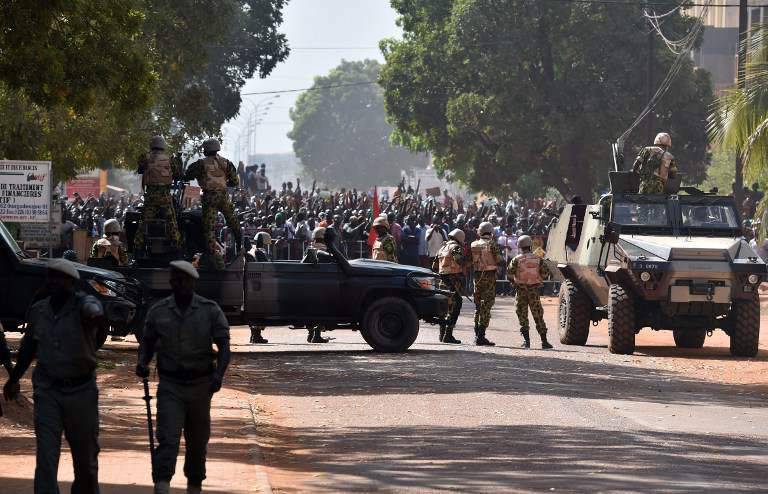
Previously, General Diendere served as security adviser to the former president of the country, Blaise Compaore, who left his post in 2014 after popular speeches called the “Black Spring” - by analogy with the Arab Spring of 2011. Democratic proponents attempted to obstruct a military coup, but on September X, soldiers of the presidential guard broke up popular protests on 17. During the dispersal of the demonstrators, according to official data, three protesters and more than 60 people were injured and injuries of varying degrees of severity. At the same time, representatives of the Presidential Guard Command reported that they had shot exclusively in the air, and they used batons only to disperse young extremists who threw stones at military personnel. Negotiations with the leaders of the military who seized power in the country began the presidents of two other West African countries - Senegal and Benin. Like Burkina Faso, Senegal and Benin are former French colonies. Countries have a lot in common stories and culture, so the leaders of Senegal and Benin expect to be able to persuade the Burkini military to release the current interim President Michel Kafando and his ministers taken hostage.
From the Upper Volta colony to the “Country of Decent People”
To understand the background of the events taking place in Burkina Faso these days, it is necessary to make a brief excursion into the history of this country. Burkina Faso is located in the west of the African continent and borders Mali in the north, Niger in the east, Benin in the southeast, Togo and Ghana in the south and Côte d'Ivoire in the southwest. The population of Burkina Faso in 2013 was estimated at 17 million 692 thousand people, but it should be borne in mind that the country has a very high birth rate, therefore the population is growing rapidly and now in the “Homeland of decent people” Faso "from local languages) lives at least 18 million. Before the colonial expansion of France in the territory of Burkina Faso, there were states created by the largest local Mosi people. At the end of the XIX century, the feudal kingdoms of Mosi became the object of an aggressive policy of the French colonialists. In 1895, French domination recognized the kingdom of Yatenga, in 1897, the French managed to colonize the kingdom of Fad-Gourmet. At the same time, the French colonial authorities did not destroy the feudal monarchies of Mosi - after all, their hierarchical structure was a great help for the colonial administration in managing the occupied territories. By name flowing through the occupied lands of the Volta River colonial possession was called Upper Volta. Since Upper Volta was landlocked, it occupied far secondary positions among other French colonial possessions in West Africa.
The social and economic infrastructure of the colony practically did not develop, the only thing that the colonialists succeeded in was the conversion of a part of the local population to Christianity, despite the fact that a significant number of Muslims lived on the territory of Upper Volta. It was only in 1934 that the railway was built, linking the Upper Volta colony with Abidjan - the then capital of the Ivory Coast. The impetus for political independence for the Upper Volta, as for many other African and Asian colonies of France, gave an end to the Second World War. In 1947, the Upper Volta colony became overseas territory of France, and in 1958 it became an autonomous republic within the French community. In the same year, Voltaine politicians considered the idea of joining the Federation of Mali, which included Mali and Senegal, but then abandoned the idea. The important role in refusing to join Mali and Senegal was played by pressure from the neighboring Ivory Coast, which played an important role in securing Upper Volta’s economic relations with the metropolis and other countries, but was very much afraid of the appearance of the Upper Volta to the Federation Mali.
The first president of Upper Volta was Maurice Yameogo, who on August 5 of 1960 declared the country's national independence. Maurice Yameogo (1921-1993) was a former official of the French colonial administration, who served as Minister of Agriculture, Minister of the Interior, and then Head of Government of the Upper Volta Autonomous Republic as part of the French community. Despite the fact that Yameogo was a civilian, he established a fairly rigid political regime in the country, banning all political parties and forming the Unity Party, which received a monopoly on political activity in the Upper Volta. However, Yamegoi’s economic and social policy left much to be desired, all the more considering that the president himself was not much bothering to improve the lives of his compatriots, but in every way he asserted his sole authority. After the election of 1965 in October, Mr. Maurice Yameogo received 99,9% of votes, unrest began in the country. 3 January 1966 Mr. Maurice Yameogo was forced to resign and was arrested. The military came to power in Upper Volta, opening a series of constant military coups and regime changes. Colonel Abubakar Sangule Lamizana (1917-2005), who succeeded Yamegoy as head of state, was a professional military man who began his career in the ranks of the French colonial forces in West Africa and was educated at the Saint-Louis military school in Senegal. In 1967, Lamizana was promoted to brigadier general. He remained in power in the country for fourteen years, but there were no major changes in the economy of Upper Volta. It remained one of the poorest countries not only in the world, but also in the African continent. On the other hand, General Lamizana spent considerable funds on strengthening the national army, which he actually created from scratch, on the basis of the remnants of the colonial units of the French army. In the end, the army overthrew its creator.
25 November 1980 was a military coup in the Upper Volta, as a result of which the Military Committee of the Upper Volta Revival came to power. Colonel Saye Zerbo (1932-2013), the head of the military intelligence service, who previously commanded the garrison of the Voltai capital Ouagadougou, became its chairman. Like his predecessor Lamizana, Zerbo began his service in the colonial troops, even managed to participate in the French colonial wars in Algeria and Indochina. However, the military rule led by Colonel Zerbo also failed to improve the socio-economic situation in the country. Moreover, Zerbo has made enemies for himself in the face of the Voltaic trade unions, which covered a significant part of the working-age population of the country who worked outside the sphere of agriculture. In 1982, in the Upper Volta, another military coup occurred. Saïe Zerbo was overthrown on November 7, and on November 8 captain Jean Baptiste Oedraogo (born 1942) became president of the country. Despite his military rank, Oedraogo was not a military officer, a medical officer (pediatrician) in his specialty, until the coup he held the position of chief physician of a military hospital in Ouagadougou. The Prime Minister of Upper Volta Oudraogo appointed a very colorful personality - Captain Thomas Sankar (1949-1987). Paratrooper officer, Sankara at the end of the 1970-ies. led the special forces training center in the city of Pau, then was secretary of state for information in the government of Colonel Saia Zerbo. The young captain of paratroopers adhered to ultra-left political views and led a group of communist officers. Sankara's personality was immediately negatively perceived in France, which maintained its influence on the political life of the Upper Volta. In the end, Oedraogo removed his prime minister from office and ordered his arrest.
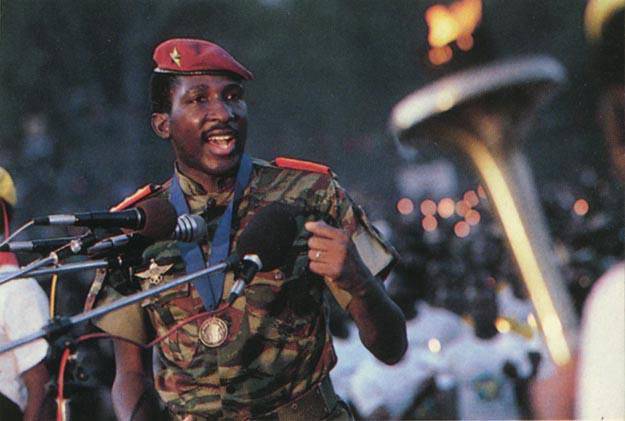
However, on August 4. 1983. Loyal to Sankara, military personnel under the command of captain Blaise Compaore released the former prime minister from prison and overthrew Ouedraogo. Thomas Sankar came to power, taking the post of chairman of the National Revolution Council. Indeed, during his reign, political, social, economic, and cultural changes took place in Burkina Faso. Perhaps we can say that Sankara performed a grand social experiment in a backward West African country. The policy of Sankara was influenced by the ideas of Marxism, anarchism, but most of all - the experience of Libya, in which another left-wing politician Colonel Muammar Gaddafi built a society of democracy of the people - the Jamahiriya. 4 August 1984, on the anniversary of the military coup called the August Revolution, Thomas Sankara renamed Upper Volta Burkina Faso - “Homeland of Decent People”. Since then, the country bears this name. But the renaming of the country was far from the only political innovation. In fact, Sankara pursued a line for the approval of democracy in the form of the transfer of managerial and military functions to the committees for the protection of the revolution. Sankara's social and economic policy was based on the concept of endogenous development put forward by Burkinian philosopher Joseph Ki Zerbo and providing for complete self-reliance in the process of social, economic and cultural development of the country. Burkina Faso’s policy during the years of Sankara’s rule was based on the following key principles: endogenous development, mass participation of the people in governing the country, emancipation of women and fighting against their discrimination, making the state institution an engine of social and economic progress. The merit of Sankara was the liquidation of Burkina Faso’s external debt. With regard to the development of the social and economic infrastructure of the country, Sankara focused on the construction of wells. It is difficult for Europeans to understand the significance of this activity for the country of the Sahel, which lies in close proximity to the Sahara sand and is regularly affected by droughts and the onset of the desert.
Political games and the assassination of Captain Sankara
For four years, Thomas Sankara managed to make numerous and influential enemies in the West. The policy pursued by the Burkinian leader did not like the American and French leaders very much. On the other hand, the leaders of other West African countries who were under the complete influence of France and who were afraid that the transformations of Sankars would provoke popular performances and the approval of left-wing governments in their own countries did not feel sympathy for Sankara. The only exception to this list was Jerry Rollings, the ruler of Ghana, who also adhered to socialist ideas and, like Sankara, who began his political career as a lieutenant in the Ghanaian air force and then came to power in a coup. Rolling Sankara constantly met, took over his experience of the political transformation of society. Difficult relationships linked Sankara with Moammar Gaddafi. Despite the fact that at the beginning of his work as chairman of the National Revolution Council, Sankara was inspired by the policies of Gaddafi, subsequently relations between the two African leaders became cooler. Some historians believe that Sankara divined Gaddafi’s plans to subordinate Burkinian politics and economics to Libyan interests and this contributed to his chilling towards the leader of the Libyan revolution.
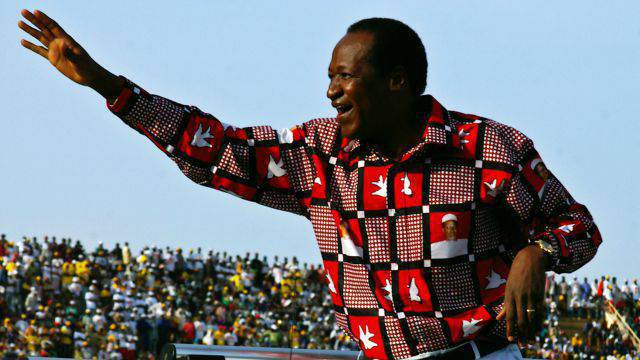
In an effort to gain control of the Liberian and Sierra Leone diamond deposits, Muammar Gaddafi recognized the need to organize support for his protégé in Liberia, Charles Taylor, from other West African countries. But, since the coup in Senegal or Mali was too much for Gaddafi, he drew attention to Burkina Faso. Sankara was very cool about this and Gaddafi found himself a new favorite in the political elite of Burkina Faso. He became the captain Blaise Compaore. He was born in 1951, and after graduating from the pedagogical school, he decided to change his teaching position to officer shoulder straps. Compaore completed a training course in one of the military schools in Cameroon, after which he began serving in the Upper Volta Army and in 1982 he was promoted to captain. He became one of the closest associates of Thomas Sankara in a group of communist officers. In fact, it was Compaore who organized the 4 military coup of August 1983 and secured Sankara's coming to power. In the government of Sankara, Compaore held the position of Minister of State - delegate and member of the National Revolution Council, and in 1984 he began to combine these posts with the duties of Justice Minister Burkina Faso. That is, Compaore was one of the most influential Burkina politicians during the years of Sankara’s rule. It is likely that this is why he was chosen as a possible successor to Sankara. Muammar Gaddafi introduced Blaise Compaore to Charles Taylor, the leader of the Liberian rebels, who was to provide the necessary military support for the upcoming coup. Taylor had his reasons for disliking Sankara. Although Sankara supported the Taylor insurgents in Liberia, he was categorically opposed to organizing training camps for the Taylor units in Burkina Faso. In turn, Compaore promised Taylor to allow the opening of camps in the country and enlisted the support of the leader of the Liberian rebels. When 15 October 1987 Mr. Thomas Sankara, accompanied by colleagues arrived at a meeting of the National Revolution Council. At this moment they were attacked by a group of armed men. Sankara and twelve of his supporters were killed. Their bodies are dismembered and buried in a mass grave. As it became known later, the attack on the head of state was carried out by a group of Burkini special forces under the command of Gilbert Dyondere, the head of the special forces training center in the city of Pau, who was once led by Thomas Sankar himself. Subsequently, Gyöndere became one of the closest confidants of Blaise Compaore and was given the position of State Security Adviser to the President of Burkina Faso.
President Blaise Compaore
After Sankara’s assassination, Blaise Compaore - at that time 36-year-old captain of the Burkinian army and government official - became president of the country and held this position for twenty-seven years. Over the decades of Compaore’s reign, virtually all the social gains of Sankara were lost. Burkina Faso has returned to the capitalist path of development, becoming the usual economic and political satellite of the West for West Africa. Burkina Faso began to work closely with the United States in the framework of the Transsahar Counter-Terrorism Partnership, and in 2007, the American military base was deployed in Ouagadougou, which became the epicenter of the US intelligence network in West Africa. The reconnaissance aircraft from the base in Burkina Faso flew to other countries in the region and to the neighboring countries of North Africa. At the same time, Compaore had a good relationship with Muammar Gaddafi for a long time, recalling the assistance that the Libyan leader had given him during the coming to power. Friendly relations with Charles Taylor, who received full support, were maintained. During the 27 years in Burkina Faso, several presidential elections were held, in which Compaore invariably won, each time gaining about 80% of votes. Naturally, such a longstanding rule of Compaore against the background of the almost complete absence of real social and economic development of the country could not but cause popular indignation. As in other African countries, the main subject of protest activity in Burkina Faso remained the army. It was the “man with a gun” that had the decisive word in the country's policy - in any case, even the most sinister dictator depended on the soldiers and officers who ensured his safety and security of his political power. Compaore at some point “got” even his “Praetorians”.
On the night of April 15 2011 in Burkina Faso, unrest occurred among the members of the presidential guard regiment stationed in Ouagadougou. It turned out that the soldiers of the regiment for a long time did not pay allowance for housing. This was the cause of the riot. The servicemen were very unhappy that the social reforms in the country did not affect the rank and file composition of the armed forces, and all the money allocated to support soldiers and sergeants was appropriated by corrupt commanders. Frightened Kompaore dismissed the government of the country, dismissed the commander of the presidential regiment and the chief of staff of the ground forces. But this was not enough for the president - 22 of April of 2011. He appointed himself Minister of Defense of Burkina Faso, deciding to concentrate in his hands the full civil and military power in the country and control the army itself. However, the performance of the soldiers continued. Students joined the military, and the Burkini opposition began to openly compare Compaore with Tunisian President Ben Ali - after all around this time violent speeches supported by the West took place in North African countries, including Egypt, Tunisia and Libya. 24 May 2011 was a mass demonstration of students, during the dispersal of which the police shot and killed three people, 136 people were injured. In response, students set fire to the offices of the ruling party in the cities of Bob-Dioulasso and Gaua. At the same time, Burkinian teachers went on strike. The next day, the government went to meet the strikers, promising to raise the salaries of school workers. In response, the teachers' union promised not to participate in anti-government demonstrations. But the baton of performances was picked up by the soldiers of military units stationed in Tenkodogo and Bobo-Dioulasso. On June 3, units loyal to Compaore dispersed a demonstration in Bobo Dioulasso, killing at least seven of the demonstrators. 13 Jun. Compaore replaced 13 governors of Burkini provinces. But, despite the fact that this time Kompaore managed to calm the masses and the rank and file of army units, it became clear that his power was seriously shaken and is no longer as strong as in 1990-2000-s. In addition, the Burkinians were inspired by the example of the Arab countries, where several political leaders were overthrown. Apparently, the West has played its role in the development of the protest movement in Burkina Faso, first of all by the French and American special services.
October Revolution 2014 of the year
In October, 2014 in Burkina Faso, riots began again. October 28 on the streets of Ouagadougou took hundreds of thousands of young people, armed with stones and fittings. The main thoroughfares of the city were blocked, shops and schools stopped their work. On October 29, several protests broke out in the capital and the police outside the parliament building, and on October 30 the police were forced to use tear gas. Nevertheless, the demonstrators broke through the police cordon and set fire to the Ouagadougou city hall and the head office of the country's ruling party, the Congress for Democracy and Progress. On the way to the presidential palace, the protesters again clashed with police and military personnel. The demonstrators burned car tires and forced government troops to retreat. The presidential guard was forced to fire demonstrators from a firearm. weapons. Army units on armored personnel carriers were put forward to defend the television station and radio station. Numerous groups of soldiers went over to the side of the rebels, and even former defense minister General Kuame Lugier. Demonstrators demanded to nominate General Lugier to the post of new president of Burkina Faso. In addition to the capital, mass unrest swept other major cities of the country. In Bobo Dioulasso, a statue of Compaore was demolished and the city hall and office of the ruling party were burned. Burkina Faso Airport in Ouagadougou was closed, and all aviation flights arriving and departing from the country were canceled. Blaise Compaore spoke on the radio with a statement on the dissolution of the government and a proposal to opposition leaders to begin negotiations. In accordance with article 43 of the Constitution of Burkina Faso, Compaoré declared a “power vacuum” with the aim of creating a transitional government and holding free elections over the next 90 days. Thus ended the 27-year history of the presidency of Blaise Compaoré. The resigned head of state flew to Senegal and later found refuge in Côte d'Ivoire. Colonel Bureima Fart, a representative of the command of the armed forces, spoke before the assembled demonstrators, who made an official announcement on the resignation of Blaise Compaoré as president of the country. Meanwhile, the chief of the General Staff of the Armed Forces of Burkina Faso, General Nabere Honore Traore (born 1957), who has held this high military post since 2011, announced the dissolution of the National Assembly of Parliament and the establishment of a transitional government. General Honore Traore also assumed the duties of the President of Burkina Faso and the Minister of Defense of the country. However, the demonstrators were dissatisfied, since Honore Traore was known as one of the closest associates of Compaoré, in which he held high military posts.
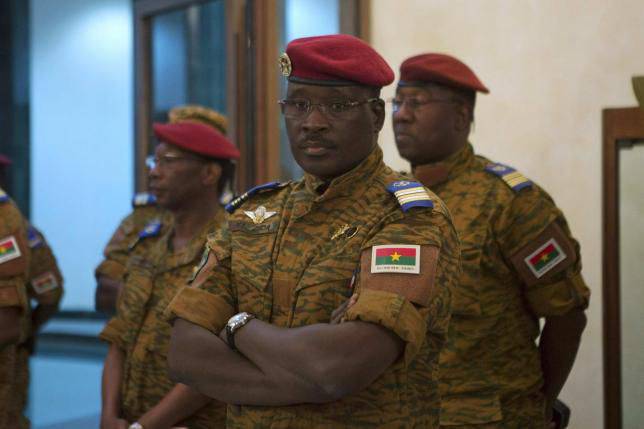
On the morning of November 1, an exchange of fire took place in the vicinity of the President’s residence in Ouagadougou. Almost immediately after the firefight, Lt. Col. Isaac Yakub Zida (born 1965), who was then deputy commander of the regiment of the presidential guard - an elite armed unit directly under the President of Burkina Faso, addressed the people. Lieutenant Colonel Zida announced that the people of Burkina Faso had conquered democracy and the main role in this was played by the Burkini youth who suffered losses in clashes with the forces loyal to Compaore. Also, the officer of the presidential guard called on the world community to appreciate the political choice made by the people of Burkina Faso in the direction of the transition to democracy. Zida said that now all army units, including the regiment of the presidential guard, are moving to the side of the insurgent people.
On the evening of November 1. 2014, Lieutenant Colonel Isaac Zid was appointed Acting President of the country. The document on this appointment was signed by General Honore Traore, who until November 23 retained the post of Minister of Defense. On November 17, Isaac Zid transferred the duties of the provisional president of the country to a civilian - Michel Kafando. Michel Kafando was born in 1942 and after graduating from the University of Bordeaux (France), he worked for the Upper Volta MFA system. In 1990, he received his doctorate in political science at the Sorbonne and was always considered not only a political figure, but also a well-known Burkini intellectual. In 1982, Mr. Kafando was appointed Minister of Foreign Affairs in the government of Ouedraogo and was in that position until 1983, and in 1998-2011. served as representative of Burkina Faso to the United Nations. Thus, it was practically possible to assert with complete confidence that Kafando is a classic protege of the West - a politician whose career took place abroad and was associated with regular interaction with the American and French leaders. Becoming the president of Burkina Faso, Michel Kafando appointed Lieutenant Colonel Isaac Zidu Prime Minister and Minister of Defense of the country. Thus, the military, who supported the October uprising, also did not remain without representation in the temporary authorities at the highest level.
Guardsmen against the new government
The new government began a gradual democratization of political life in the country, which included, among other things, limiting the influence of the armed forces on Burkina’s policy. 14 September 2015, at a government meeting, discussions began on the dissolution of the presidential guard. This armed formation was considered the main pillar of the ousted president, Blaise Compaore, and until now many soldiers and officers of the presidential guard maintained sympathy for the former chief. This new leaders of Burkina Faso and feared. The regiment of the presidential guard was considered the most elite armed formation of the country and was directly subordinate to the president, not part of the structure of the Burkini army. It was the units of the presidential regiment that provided the personal protection of Blaise Compaore and were the main force during the suppression of mass popular uprisings in the capital, Ouagadougou. The people guards regiment called the "iron fist Compaore." Among the members of the presidential guard, the idea of disbanding their units met with a sharply negative reaction. Still - the level of supply and financial support of the presidential guard, as well as the status of the service, differed significantly for the better from ordinary army units. Resigning into a poor Burkina Faso meant becoming unemployed, and going into army units — significantly worsening their economic situation, especially since the army also lacked such a large number of vacant positions for reduced guard troops. On September 16, soldiers and officers of the Presidential Guard broke into the government building and detained Acting President Michel Kafando, Prime Minister Lieutenant Colonel Isaac Zied, Ministers Augustin Loadu and René Bagoro. When a column of demonstrators - supporters of Kafando and Zida came to the presidential palace, soldiers of the presidential guard used firearms against the demonstration. On September 17, officers of the presidential guard announced the dissolution of the existing authorities and the creation of the National Democracy Council. Lt. Col. Mamadou Babma spoke on the country's state television, who reported that Kafando was deprived of his duties as acting president of the country and resigned, and the anomalous transition period in the country's political life is ending. The military said that “patriotic and democratic forces united all members of society within the National Council of Democracy,” a representative of the putschists said. - It was decided to put an end to the temporary regime that existed until now. The interim president was removed from power, the transitional government was dissolved (quoted in: Coup in Burkina Faso: the European Union demanded the release of the president and prime minister // http://euronews.com/2015/09/17/burkina-faso-military- coup /)
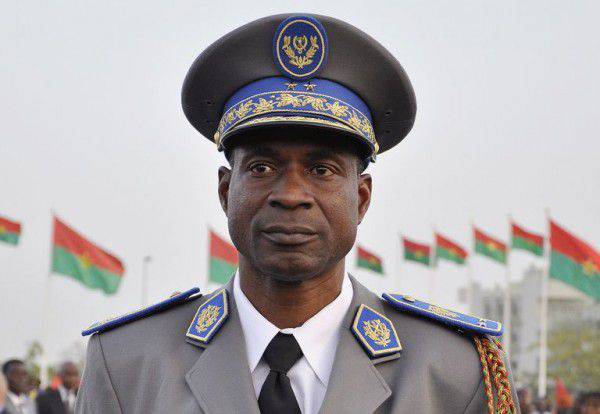
Brigadier General Gilbert Dyendere (born 1960) was declared the head of the transitional council, who assumed the functions of governing the country. It was Diendere 28 years ago that led the assassination of Thomas Sankara and his associates, and later became one of the closest assistants and proxies of Blaise Compaore. For many years, General Diendere commanded the Burkina Faso presidential guard and served as security adviser to the president. At the end of 2014, after the overthrow of Compaore, Gyöndere was dismissed from the post of commander of the presidential guard, but he maintained close ties with the guards officers and the influence on the soldiers' masses. Apparently, the coup organized by Gyondere and his supporters was supported by Compaore. But the majority of African states did not recognize the new authorities of Burkina Faso. 17 September 2015 The UN Security Council described the events in Burkina Faso as illegal seizure of power and demanded the release of all hostages taken by the presidential guards. The African Union also called the organizers of the coup terrorists and accused them of creating a political threat to the security of the entire African continent. The leadership of the putschists was warned of possible sanctions by the world community in the event of refusal to release the captured hostages and return the government to the hands of a civilian transitional government. De facto, after the coup d'état of Burkina Faso, it was practically isolated, even among the once-friendly African states.
Apparently, the pressure of African countries played a role in changing the political line of the coup. On September 19, Benin’s President Thomas Boni Yayy met with General Gilbert Diendere, who, following the meeting, announced that power in the country would soon be returned to the transitional government under the leadership of Michel Kafando. It is likely that the presidential guard will really transfer power to the civilian government, meeting with international misunderstanding of the events, which has already resulted in the temporary suspension of Burkina Faso membership in the African Union. In any case, in the near future the political regime in the country should change, as the events taking place only contribute to further destabilization of the military-political and social situation in the country. On the other hand, a great deal depends on what actions the “elder brother” will take - France, which retains a great political influence on Burkina Faso. The US position also plays an important role. While the world community demonstrates a sharp rejection of the political events of the past days. So, the European Union demanded the immediate release of the interim president of the country Kafando and his ministers. In the end, the commanders of the presidential guard went to meet the demands of international organizations and freed Kafando. At the same time, the land and air borders of Burkina Faso were opened, which immediately after the military coup were closed by the junta formed by the guardsmen. Apparently, the presidential election, which was supposed to be held on October 12, due to a military coup will be postponed for another month. It is likely that the presidential guard can take control over ensuring their holding not only in terms of protecting polling stations and candidates, but also in terms of organizing the transfer of power to the newly elected head of state.
Meanwhile, it should be noted that the social and economic problems facing Burkina Faso really need an urgent and effective solution. The republic remains one of the poorest countries in the African continent. Over 90% of the working-age population is employed in agriculture, but it provides no more than a third of Burkina Faso's GDP. This is explained by the fact that only a small part of the Burkinian lands is suitable for farming. Sands are attacking savannah, droughts entail a lack of harvest and, as a result, eternal problems with food. The complexity of the conditions for farming in Burkina Faso prompts many Burkini farmers, especially those of a young age, to leave for neighboring Côte d'Ivoire as seasonal plantation workers. Cotton and gold are exported - poor agriculture of Burkina Faso is focused primarily on the needs of the domestic market. Most of the peasant farms produce sorghum and millet, as well as other crops used for writing by the peasants themselves. In industry, only 10% of the population is employed. Naturally, the weakness of the country's economy is reflected in its social development. The majority of the population of Burkina Faso lives in poverty, but this does not prevent the growth of the population of the country. For example, Burkina Faso ranks 11 in the world in terms of natural population growth, and 6 ranks in the world in female fertility (the average woman in Burkina Faso accounts for 6,2 births). Regarding the birth rate, Burkina Faso is the fourth largest in the world - at 1000 a person is born here a 44 person. At the same time, the infant mortality rate is very high in the country - it is 83 person per 1000 person population (that is, almost every tenth infant dies). Only 29% of men and 15% of women of Burkina Faso can read and write, the bulk of the country's peasant population is illiterate. Sankara’s policy aimed at modernizing Burkina’s society was curtailed during the years of Compaore’s rule, and today, in a state of political chaos and economic crisis in Burkina Faso, there’s no real solution to the social problems of the population of this country.
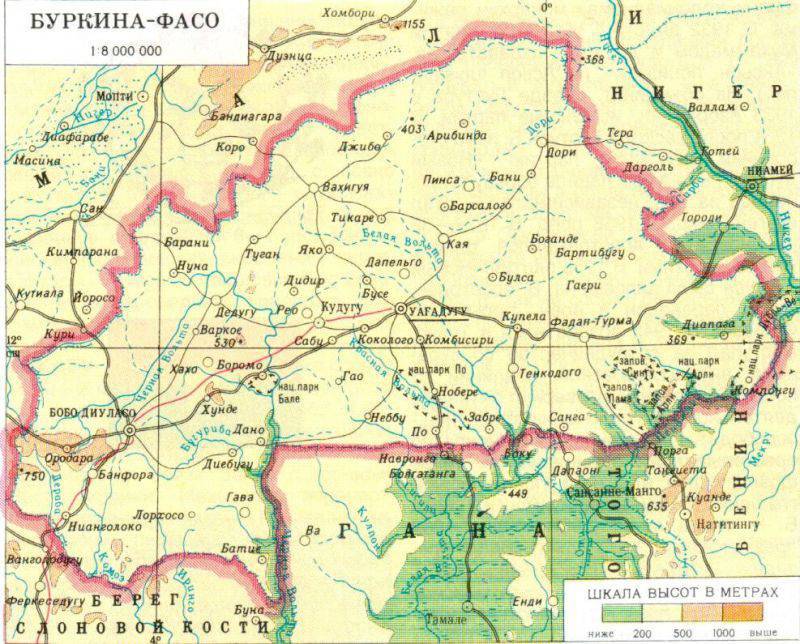
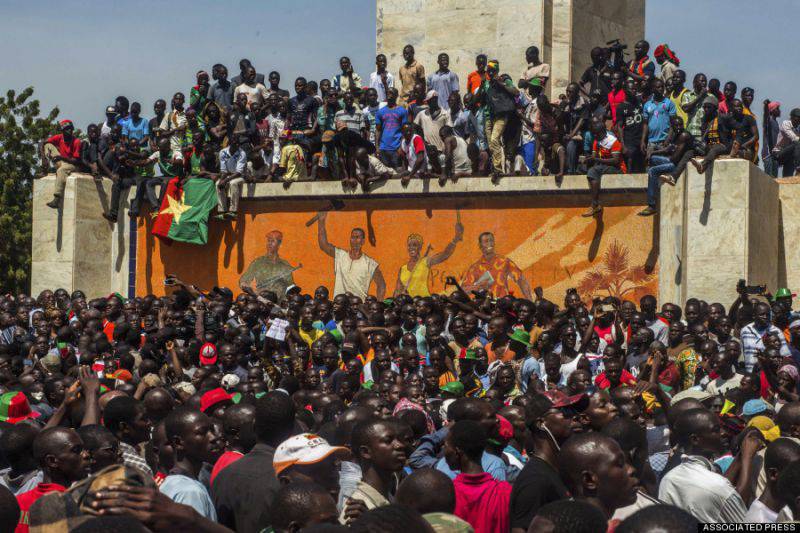
Information